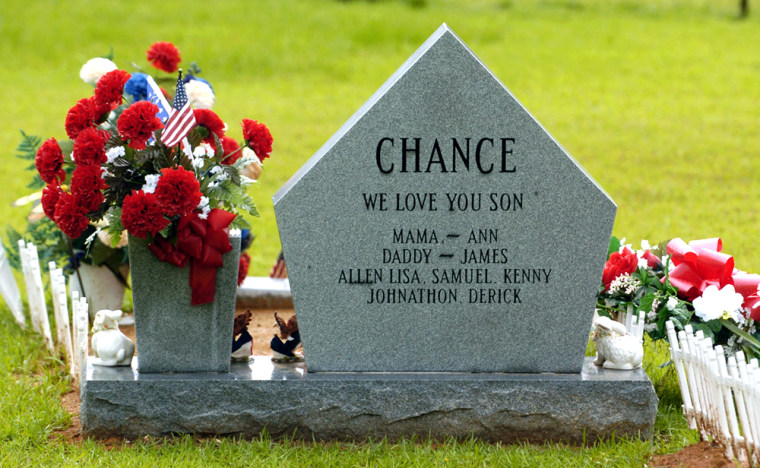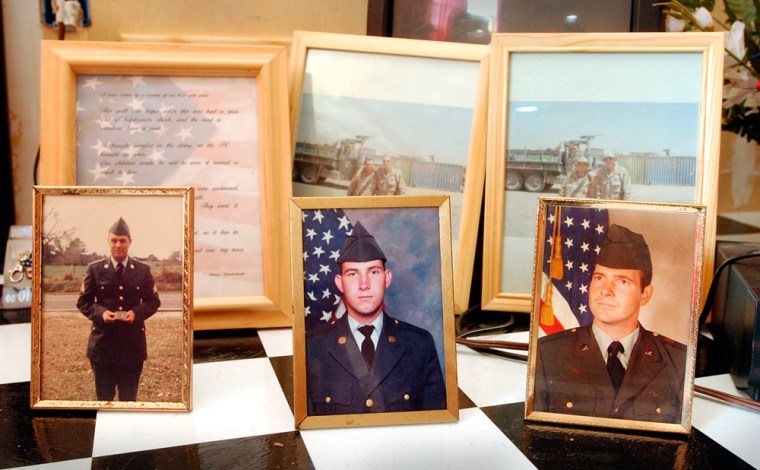From the porch of James A. Chance Jr.’s mobile home, you can see his namesake.
There, he says, is his son — the one who got his father’s dark hair and broad forehead; the one who followed Daddy and Granddaddy into the military; the one who would one day pass on their name to a fourth generation.
There, across the street, beyond a grove of tall oak trees, where gray stones rise from a field of green grass.
There, where a pentagon-shaped marble headstone bears the inscription, “Army Spc. James A. Chance III.”
“When Jimmy died,” the father says, “the name died too, I reckon.”
With every death of a U.S. soldier in Iraq or Afghanistan, somewhere a family grieves. This Memorial Day, they mourn the loss of love that will never be returned, of memories that will never be made, of a life that will never be lived.
For dozens of families, there is an another kind of loss — the loss of a tradition of names passed down, from grandfather to father, father to son.
For some, the death is a missing name in a living lineup, a lost senior or junior or third or fourth who had already passed on the name. For many, it is simply the end.
‘He was the hope for the family name’
For the family of Army Spc. Eugene Uhl III, that ending came on Nov. 15 when two Blackhawk helicopters collided over Mosul, Iraq.
“He was the only male Uhl to pass the name on,” said his mother, Joan Uhl, from her Amherst, Wis., home. “He was the hope for the family name.”
As a high school student, Uhl listened as his father tried to dissuade him from military service. The elder Uhl had served in Vietnam and earned a Purple Heart for wounds he received to his face.
But the son wanted to be a soldier, and he joined the 101st Airborne. The 21-year-old Uhl was planning to marry his high school sweetheart upon his return, his mother says. One day, he hoped, his own family would include a namesake.
“He loved his name. He told his father, if he had a son, he would name it the fourth,” his mother said.
With the name of the father
A number of pregnant widows of soldiers killed in Iraq and Afghanistan have named sons for their fathers.

When Shauna O’Day gave birth to a daughter, she wanted the child to carry the name of her father, Marine Lance Cpl. Patrick O’Day of Santa Rosa, Calif., who died in the first days of the Iraq fighting. She named the baby Kylee Marie Patrick O’Day.
Army Staff Sgt. Frederick L. Miller Jr. of Hagerstown, Ind., was killed Sept. 20 in an explosion while on patrol outside Ramadi, Iraq.
His father treasures a letter home, a letter of thanks. “You know dad,” the namesake wrote, “when I look down at my name, I’m proud.”
The name is just a memory now — or carving on a headstone, with “A Fallen American Hero” beneath, as in the case of James Anderson Chance III.
Memories of ‘Jimmy Cricket’
For the Chance family in this small Mississippi logging town, the namesake tradition ended with 25-year-old Jimmy’s death in the Iraqi desert on Nov. 6. The truck he was driving hit a land mine.
“All we got left of him is what we remember,” his father says.
The son had a nickname, “Jimmy Cricket,” earned in childhood. Homemade signs posted on lawns and in windows around Kokomo use a more formal name: “We love you James” and “Rest in Peace James.”
The Chances say they always hoped their youngest son would leave and one day return.
“I wanted him to go to college,” said his mother, Patricia Chance. “There wasn’t nothing for him around here.”
But the younger Chance inherited more than just his name from his father. He also had his father’s interest in fixing up old, banged-up cars and trucks. He had his father’s knack for storytelling, spinning tales of mischievous acts.
In father's footsteps
It was no surprise to the family when Jimmy followed in the footsteps of James A. Chance Jr. and Sr. by joining the military.
He joined the Army in 1997 after high school, serving one tour of duty before getting out and then joining the Mississippi National Guard in 2002. Then he told his father he wanted to take advantage of its higher-education opportunities and make something of himself.
Chance’s unit — part of the 890th Engineer Battalion in southern Mississippi — was called up for duty in Iraq in 2003.
“He took my place,” said the elder Chance, a former National Guardsman himself.
Sitting in a hospital bed set up in the family’s living room because he suffers from congestive heart failure, Chance proudly tells of his family’s legacy.
The first James A. Chance served in World War II, and the son was an Army cook in Vietnam in 1967. In 1978, Chance Jr. joined the National Guard and was later deployed to Panama during the ouster of Manuel Noriega.
War's horrors made clear
Chance says he hid nothing from his son about the horrors of war. Death, his son knew, was a possibility.
Along the walls of one room, framed posthumous military honors — the Purple Heart, Bronze Star and the Mississippi Magnolia Cross, a National Guard honor — are propped up along the floor.
On a small table in one corner, a framed picture of Jimmy Chance is surrounded by ceramic angels. Nearby, there are pictures of his brother’s children.
Next to it, his mother says, is where the photos of Jimmy’s children — maybe including a namesake — would one day have been placed.
It is an empty space.
